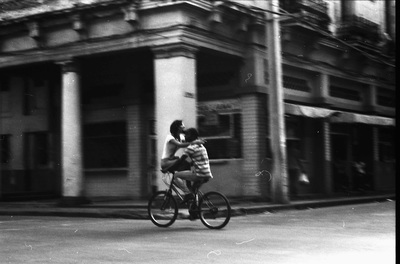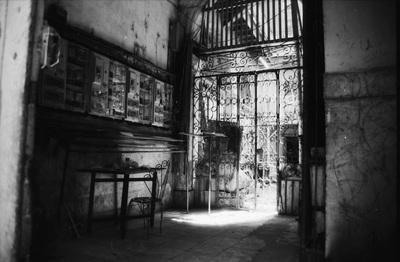Cuba is different. I rather wonder if these images will do better justice to my experience of the place than any words can, but I feel a paragraph or two of context is necessary (or, skip over this nonsense and scroll down for the photos already!).
I was in La Habana for about sixty hours, and I spent most of those hours walking the streets with a camera, pockets stuffed with film rolls. When traveling I like to get a sense of what ordinary life is like, here on the far corners of the world, spaces and attitudes and rooms people call home.
I won't say the major attractions don't hold interest, because for historical or cultural reasons they often do, but the superior thrill is slipping into the side streets, strolling by unbeknownst. An unshaved figure keeping to the walls, in a dirty t-shirt and scuffed jeans… I'm thankful I can pass for native in so many countries (as long as I keep my big mouth shut!). Slum-like in appearance but not in attitude, the adjoining Viejo and Centro municipalities are comprised largely of shanties and precarious solares (inner-city mansions subdivided into small dwelling units), and for me the biggest draw were the back alleys and residential areas, where I spent the most time. What does the air taste like? How are the silences different, and how are they similar? What has been invisible to me until now, and how is the light, the ever-present light, silent but benevolent, how does it read now, in my heart and in my mind?
I've often thought about how I might feel more comfortable in an earlier time period. Nothing extreme, you understand, just a turn back of the clock to a time more oriented around the tactile, before virtual reality, digitization, and the accelerated technological rush toward the 21st-century ideal, that unique and befuddling mixture of chaos and laziness. A time when telephones worked because they had a cord connecting to the wall, if you know what I mean.
Cuba offers just such an opportunity. For all meaningful intents it is a time machine, the most obvious indication of which are the vehicles. Not even China smells like this. The exhaust generated by a sea of Chevys, Daewoos, Citrons, and Peugeots may not be as visually polluting as parts of east and southeast Asia, but nasally, you won't forget about it. Genius mechanics toil away on the curbsides of countless roads, fixing up cars older than they are. Toilet paper goes not in the toilet but in a basket adjacent, which during the 90-degree heat caused its own sort of perfume; the bus system, generally for locals only, has lines which run only once every couple hours, and use buses obtained twenty years ago from a Chinese negotiation that didn't include a maintenance contract. Any description of their poor running ability would be an understatement. They are stuffed to the point that arms and heads stick out not just from the windows but the doors too; getting ejected from one has been compared to being birthed! Families spill out of the overcrowded city center, sitting on stoops or languishing in open rooms of collapsing, unelectrified buildings which recall postwar France.
I listened to the water drip from the ceiling cracks to the floor in my hotel room, creating a swamp-like element with its own hazards. For reasons too complex to explain here I didn't eat or drink on my last day there, instead guzzling uncalculated loads of tap water upon my evening return to the hotel, which tasted… different, and couldn't have helped with the Traveller's Diarrhea/Dengue Fever I contracted shortly after, knocking me out upon coming home for a period nearly as long as the vacation itself.
All of which is to say, there are certain things about our age to be grateful for. I was thankful for the experience. People were kind. The architecture, the cars, the decay, texture, smiles, sun... I had have a great but exhausting time, as I generally do when traveling alone, where there's no one to hold you back, but also no one to help pace yourself. To walk ever onward through an endless grid of alleys, diving deep into the artist headspace and working with the light, wrestling with it, coaxing it, watching it change, was a dream. That I returned unharmed is a privilege. I believe all good pictures are actually pictures of light; I hope you enjoy these 81 images, culled from 797 photos. As always, there's no digital manipulation; each of these is an uncorrected negative (or in the case of slide film, positive) scan.
All photographers carry around in their head a roster of the images they've seen but weren't able to photograph– sunsets, faces, shadows, all when the camera was out of reach. In accordance with Joan Didion's claim that all the most beautiful things she's seen in her life have been from airplane windows, one such moment for me was gazing down at the Panama Canal, where an endless flotilla of ships stretched out over still aquamarine flats, way down there, motionless, receding into the hazy distance.
I was in La Habana for about sixty hours, and I spent most of those hours walking the streets with a camera, pockets stuffed with film rolls. When traveling I like to get a sense of what ordinary life is like, here on the far corners of the world, spaces and attitudes and rooms people call home.
I won't say the major attractions don't hold interest, because for historical or cultural reasons they often do, but the superior thrill is slipping into the side streets, strolling by unbeknownst. An unshaved figure keeping to the walls, in a dirty t-shirt and scuffed jeans… I'm thankful I can pass for native in so many countries (as long as I keep my big mouth shut!). Slum-like in appearance but not in attitude, the adjoining Viejo and Centro municipalities are comprised largely of shanties and precarious solares (inner-city mansions subdivided into small dwelling units), and for me the biggest draw were the back alleys and residential areas, where I spent the most time. What does the air taste like? How are the silences different, and how are they similar? What has been invisible to me until now, and how is the light, the ever-present light, silent but benevolent, how does it read now, in my heart and in my mind?
I've often thought about how I might feel more comfortable in an earlier time period. Nothing extreme, you understand, just a turn back of the clock to a time more oriented around the tactile, before virtual reality, digitization, and the accelerated technological rush toward the 21st-century ideal, that unique and befuddling mixture of chaos and laziness. A time when telephones worked because they had a cord connecting to the wall, if you know what I mean.
Cuba offers just such an opportunity. For all meaningful intents it is a time machine, the most obvious indication of which are the vehicles. Not even China smells like this. The exhaust generated by a sea of Chevys, Daewoos, Citrons, and Peugeots may not be as visually polluting as parts of east and southeast Asia, but nasally, you won't forget about it. Genius mechanics toil away on the curbsides of countless roads, fixing up cars older than they are. Toilet paper goes not in the toilet but in a basket adjacent, which during the 90-degree heat caused its own sort of perfume; the bus system, generally for locals only, has lines which run only once every couple hours, and use buses obtained twenty years ago from a Chinese negotiation that didn't include a maintenance contract. Any description of their poor running ability would be an understatement. They are stuffed to the point that arms and heads stick out not just from the windows but the doors too; getting ejected from one has been compared to being birthed! Families spill out of the overcrowded city center, sitting on stoops or languishing in open rooms of collapsing, unelectrified buildings which recall postwar France.
I listened to the water drip from the ceiling cracks to the floor in my hotel room, creating a swamp-like element with its own hazards. For reasons too complex to explain here I didn't eat or drink on my last day there, instead guzzling uncalculated loads of tap water upon my evening return to the hotel, which tasted… different, and couldn't have helped with the Traveller's Diarrhea/Dengue Fever I contracted shortly after, knocking me out upon coming home for a period nearly as long as the vacation itself.
All of which is to say, there are certain things about our age to be grateful for. I was thankful for the experience. People were kind. The architecture, the cars, the decay, texture, smiles, sun... I had have a great but exhausting time, as I generally do when traveling alone, where there's no one to hold you back, but also no one to help pace yourself. To walk ever onward through an endless grid of alleys, diving deep into the artist headspace and working with the light, wrestling with it, coaxing it, watching it change, was a dream. That I returned unharmed is a privilege. I believe all good pictures are actually pictures of light; I hope you enjoy these 81 images, culled from 797 photos. As always, there's no digital manipulation; each of these is an uncorrected negative (or in the case of slide film, positive) scan.
All photographers carry around in their head a roster of the images they've seen but weren't able to photograph– sunsets, faces, shadows, all when the camera was out of reach. In accordance with Joan Didion's claim that all the most beautiful things she's seen in her life have been from airplane windows, one such moment for me was gazing down at the Panama Canal, where an endless flotilla of ships stretched out over still aquamarine flats, way down there, motionless, receding into the hazy distance.





























































































